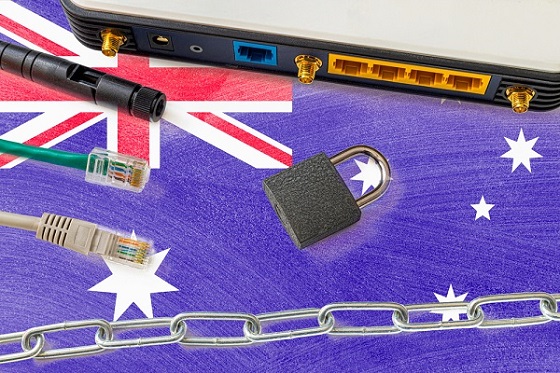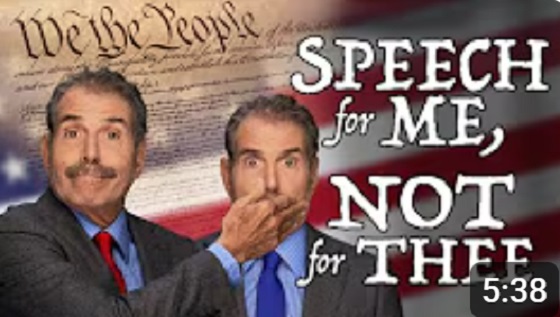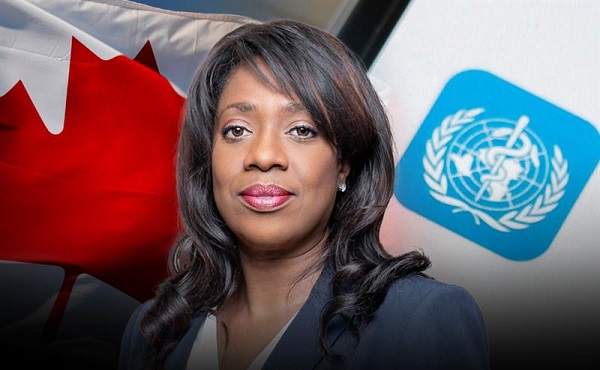Censorship Industrial Complex
New Australian law, if passed, will make the gov’t the sole arbiter of truth’

From LifeSiteNews
By David James
The main purpose of the legislation is to silence critics of the Australian government’s response to the Covid-19 crisis. What they have done instead is demonstrate that Australia does not have adequate protection for free speech, nor is it a democracy.
In a crushing blow to free speech in Australia, the lower house of federal parliament has passed an amendment, known as the Misinformation and Disinformation Bill, to the Broadcasting Services Act 1992. It imposes obligations on digital communications platform providers to prevent the dissemination of content “that contains information that is reasonably verifiable as false, misleading or deceptive, and is reasonably likely to cause or contribute to serious harm of a specified type (misinformation and disinformation).”
Several dissenting politicians have expressed outrage and incredulity at the legislative move. Nola Marino, a member of the right-wing opposition Liberal Party said that she did not think that Australia, a liberal democratic society, would ever be “debating a bill that is explicitly designed to censor and silence the Australian people.”
National Party member Keith Pitt described the legislation as a “yawning chasm that is incredibly … dangerous to this country.” He expressed shock that the amendment was being put forward, adding that Western democracies such as Australia have been built on freedom of expression and freedom of religion. Such principled objections were ignored, however. The legislation now has only to pass in the Senate (the upper house) to become law.
The first and most obvious criticism of the law is that it puts the government authority, the Australian Communications and Media Authority (ACMA) in the ridiculous position of deciding what is and isn’t “false” information. That is not only absurd – how could ACMA, for example make judgements on subjects like vaccines or viruses – it means that the law cannot be applied universally.
Governments routinely put out false information, arguably more often than they put out true information. Will they be penalized? Of course not. Advertisers present information that is false. Will they fall under his law? No. It will only be directed at people who are saying things that the government does not like, especially in relation to health policy. It is politics, not law.
When governments distort the law for political ends, it inevitably ends up in badly crafted legislation, and that is what has happened here. The law depends for its integrity on clear semantics, words whose definition is clear. But two key words, “misinformation” and “disinformation” are misleading at best.
They are variants of the word “information”; the prefixes “dis” and “mis” have been added to create the impression that what is at issue is objective truth (“information” being something objectively observable). It is a diversion. What is happening instead is that the law will target the intent of the writers.
Disinformation is defined as information that is “intended” to mislead and to cause harm. With misinformation there is no such intent; it is just an error, but even there it requires determining what is in the author’s mind. The aim is to outlaw thinking that is not congruent with the governments’ official position.
Determining a writer’s or speaker’s intent is all but impossible, however, because we cannot get into another person’s mind, only speculate on the on their motivations. Thus, someone who produces content that is deemed to be false and have caused damage could say that it was meant as irony, not literally. How is it possible to prove otherwise?
Pointing out this definitional slipperiness could be the basis for an effective rebuttal of the legislation. Courts are very poor at establishing intent.
A second problem: How do we know what meaning the recipients will get? Glance at the comments on social media posts and you will see an extreme array of views, ranging from approbation to intense hostility. To state the obvious, readers think for themselves and inevitably derive different meanings. Anti-disinformation legislation, which is justified as protecting people from bad influences for the common good, is not merely patronizing and infantilizing, it treats citizens as mere machines ingesting data – robots, not humans. It is legislation that is not just aimed at controlling the thoughts of the producers of the content, it is targeted at the thoughts of the recipients: two layers of absurdity. The result would be like targeting the “thought crimes” depicted in George Orwell’s Nineteen Eighty Four.
Censorship regimes operate on the assumption that if a sufficient proportion of the available content is skewed towards pushing state propaganda, then the audience will inevitably be persuaded to believe the authorities. But what matters is the quality of the content, not the quantity of the messaging. Repetitious expressions of the government’s preferred narrative eventually become meaningless, while sound analyses will cut through.
The main purpose of the legislation is to silence critics of the Australian government’s response to the COVID-19 crisis. The aim is to ensure that in future health authorities and the political class are immune from scrutiny and criticism. It is unlikely to be effective. What they have done instead is demonstrate that Australia does not have adequate protection for free speech, nor is it genuinely a democracy.
Censorship Industrial Complex
Canada’s justice minister confirms ‘hate crimes’ bill applies to online content

From LifeSiteNews
Individuals could be criminally charged for social media posts or other online content deemed offensive by the government under the Combating Hate Act.
Canadian Justice Minister Sean Fraser admitted that his new “hate crime” bill would indeed allow a person to be criminally charged for social media posts deemed offensive by the government.
Recently asked about Bill C-9, the Combating Hate Act, Fraser said the bill would indeed apply to certain online content that involves the “willful promotion of hatred.”
“Generally speaking, the law will apply equally online as it does in real communities,” he said, adding, “just in the limited circumstances where there is the willful promotion of hatred against someone.”
As reported by LifeSiteNews, Bill C-9 has been blasted by constitutional experts as allowing empowered police and the government to go after those it deems have violated a person’s “feelings” in a “hateful” way.
Bill C-9 was brought forth in the House of Commons on September 19 by Fraser. The Liberals have boasted that the bill will make it a crime for people to block the entrance to, or intimidate people from attending, a church or other place of worship, a school, or a community center. The bill would also make it a crime to promote so-called hate symbols and would, in effect, ban the display of certain symbols such as the Nazi flag.
While being questioned by Conservative MP Andrew Lawton about Bill C-9, Fraser was asked if the new law would “affect what people can say and write on the internet” and also if people could be retroactively punished for online comments made today.
In reply, Fraser said, “The only circumstance where you could imagine some online comment attracting scrutiny under this law would attach to behaviour that is criminal today but would be punished less severely.”
He said that “(t)he willful promotion of hate is a crime today, but we want to recognize a distinct charge where that same behaviour uses certain symbols of hate to bring a higher degree of culpability.”
John Carpay of the Justice Centre for Constitutional Freedoms (JCCF) has blasted Bill C-9 as something that would “empower police” and the government to go after those it deems have violated a person’s “feelings” in a “hateful” way.
Also, as reported by LifeSiteNews, Conservative MP Leslyn Lewis called out the hypocrisy of Bill C-9 for being silent regarding rising “Christian hate.”
Lewis has warned before that Bill C-9 will open the door for authorities to prosecute Canadians’ speech deemed “hateful possibly.”
Carpay also lamented how the bill mentions “rising antisemitism” but says nothing about the arson attacks on Catholic and Christian churches plaguing Canada.
“Anti-Catholic hate is obviously not on the minister’s radar. If it were, he would have mentioned it when introducing the Combating Hate Act,” Carpay wrote.
Since taking power in 2015, the Liberal government has introduced numerous new bills that, in effect, censor internet content and restrict people’s ability to express their views.
Censorship Industrial Complex
Who tries to silence free speech? Apparently who ever is in power.

Now that Trump is running Washington, Conservative thinkers must ponder a new-found appreciation for silencing speech they don’t like.
From StosselTV
War on Words: Both Parties Try to Silence Speech They Don’t Like
Donald Trump, before he was reelected, said he’d end government censorship. But now that he’s in office? He calls speech he doesn’t like “illegal.”
Free Speech should be a bedrock American value, no matter who’s in office. After the murder of Charlie Kirk, Republicans, who once complained about censorship, became censors. Democrats suddenly flip-flopped. All politicians should remember, the way to fight speech you don’t like, is with more speech, not censorship.
After 40+ years of reporting, I now understand the importance of limited government and personal freedom.
——————————————
Libertarian journalist John Stossel created Stossel TV to explain liberty and free markets to young people.
Prior to Stossel TV he hosted a show on Fox Business and co-anchored ABC’s primetime newsmagazine show, 20/20.
Stossel’s economic programs have been adapted into teaching kits by a non-profit organization, “Stossel in the Classroom.” High school teachers in American public schools now use the videos to help educate their students on economics and economic freedom. They are seen by more than 12 million students every year.
———
To make sure you receive the weekly video from Stossel TV, sign up here: https://www.johnstossel.com/#subscrib…
———
-

 Agriculture21 hours ago
Agriculture21 hours agoFrom Underdog to Top Broodmare
-

 International2 days ago
International2 days agoTrump, Putin meeting in Hungary called off
-

 Carbon Tax2 days ago
Carbon Tax2 days agoBack Door Carbon Tax: Goal Of Climate Lawfare Movement To Drive Up Price Of Energy
-

 Alberta2 days ago
Alberta2 days agoCalgary’s High Property Taxes Run Counter to the ‘Alberta Advantage’
-

 City of Red Deer1 day ago
City of Red Deer1 day agoCindy Jefferies is Mayor. Tristin Brisbois, Cassandra Curtis, Jaelene Tweedle, and Adam Goodwin new Councillors – 2025 Red Deer General Election Results
-

 Alberta1 day ago
Alberta1 day agoAlberta’s licence plate vote is down to four
-

 Bruce Dowbiggin1 day ago
Bruce Dowbiggin1 day agoIs The Latest Tiger Woods’ Injury Also A Death Knell For PGA Champions Golf?
-

 Health21 hours ago
Health21 hours agoSovereignty at Stake: Why Parliament Must Review Treaties Before They’re Signed




